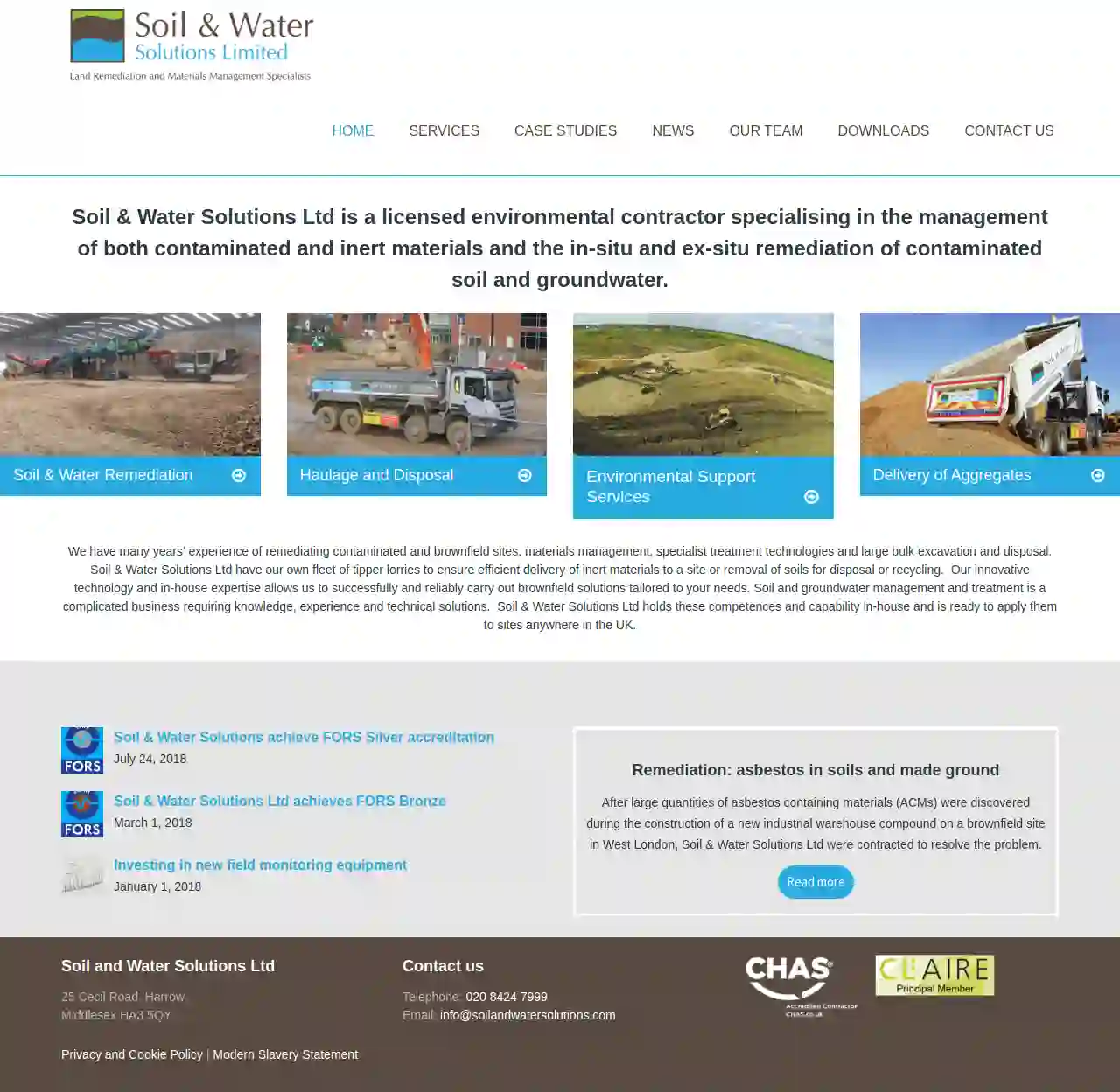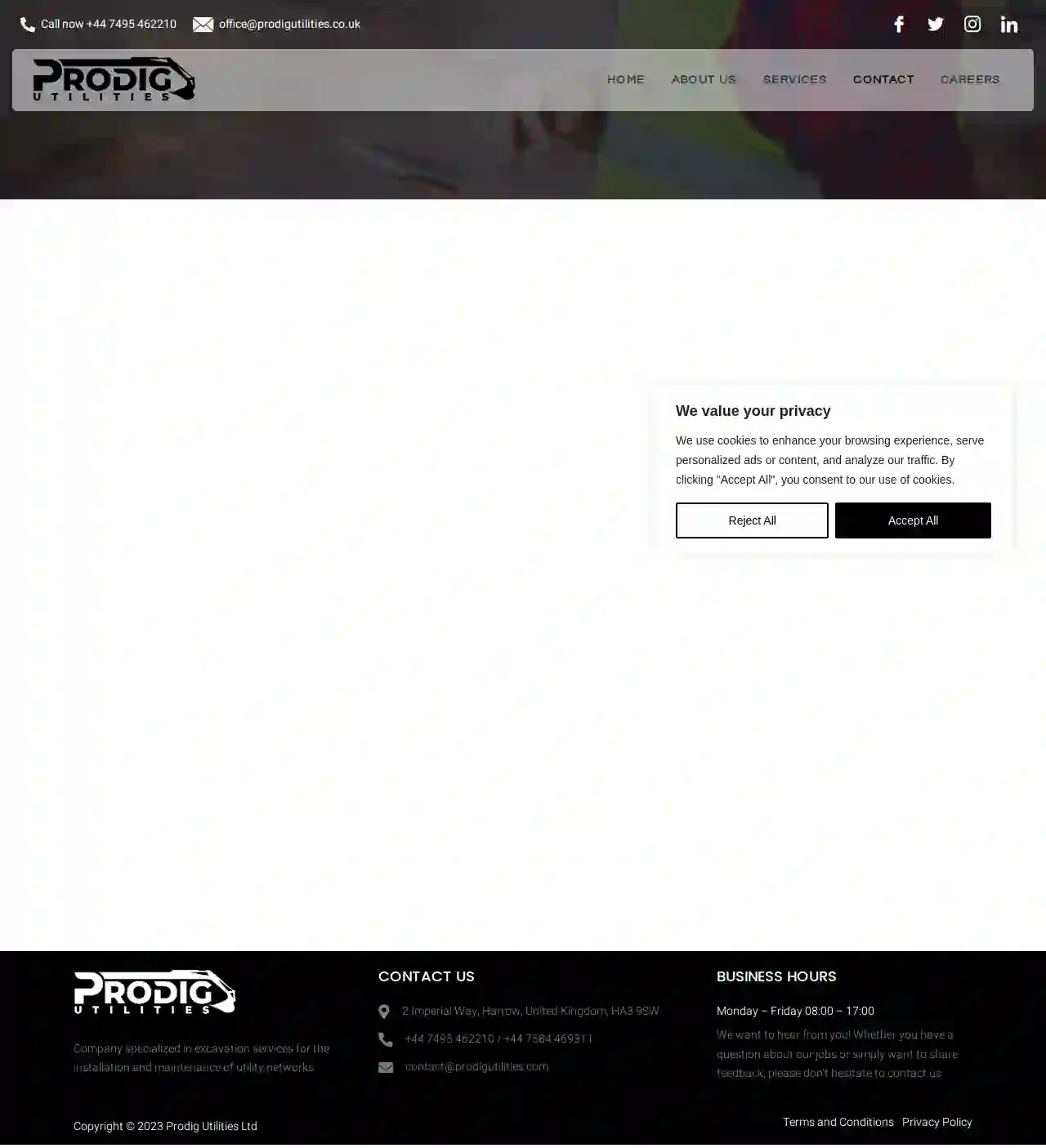Demolition Contractors Harrow
Find the best Local Demolition Contractors in Harrow
Get multiple Demo Contractor quotes for your project today! Compare profiles, reviews, accreditations, portfolio, etc... and choose the best deal.

Soil and Water Solutions Ltd
2.52 reviews25 Cecil Road, Harrow, Middlesex, HA3 5QY, GBSoil & Water Solutions Ltd is a licensed environmental contractor specializing in the management of both contaminated and inert materials and the in-situ and ex-situ remediation of contaminated soil and groundwater. We have many years’ experience of remediating contaminated and brownfield sites, materials management, specialist treatment technologies and large bulk excavation and disposal. Soil & Water Solutions Ltd have our own fleet of tipper lorries to ensure efficient delivery of inert materials to a site or removal of soils for disposal or recycling. Our innovative technology and in-house expertise allows us to successfully and reliably carry out brownfield solutions tailored to your needs. Soil and groundwater management and treatment is a complicated business requiring knowledge, experience and technical solutions. Soil & Water Solutions Ltd holds these competences and capability in-house and is ready to apply them to sites anywhere in the UK.
- Services
- Why Us?
- Gallery
Get Quote
Prodig Utilities
12 Imperial Way, Harrow, HA3 9SW, GBUnderground utilities contractors Prodig Utilities Ltd is a company specialized in excavation services for the installation and maintenance of utility networks. We are dedicated to providing high-quality services with attention to detail and a focus on health and safety. About Us We are a team of experienced and skilled underground utility contractors providing high-quality services to clients across London, committed to delivering top-quality results while maintaining a safe and respectful work environment for everyone involved. “Our company was founded on the principles of integrity, professionalism and a commitment to excellence in everything we do.” Our Services We are a provider of reliable and efficient underground utility installation services for residential, commercial and industrial clients. At our company, we understand the importance of reliable and safe utilities, which is why we are committed to delivering high-quality services that meet all local and national regulations.
- Services
- Why Us?
- Gallery
Get Quote
Over 3,630+ Excavation Businesses registered
Our excavation contractors operate in Harrow and surroundings!
ExcavationHQ has curated and vetted the Best Excavation Pros arround Harrow. Find a top & reliable business today.
Frequently Asked Questions About Demolition Contractors
- General Liability Insurance: Covers bodily injury or property damage to third parties caused by the contractor's negligence.
- Workers' Compensation Insurance: Provides benefits to workers injured on the job.
- Pollution Liability Insurance: Covers costs associated with environmental contamination caused by demolition activities.
- Professional Liability Insurance: Protects against claims of negligence or errors in professional services, such as demolition planning or consulting.
- Site Security: Secure the demolition site with fencing and warning signs to prevent unauthorized access.
- Personal Protective Equipment (PPE): Workers should wear appropriate PPE, including hard hats, safety glasses, gloves, and steel-toe boots.
- Hazardous Material Removal: Properly identify and remove asbestos, lead paint, or other hazardous materials before demolition begins.
- Utility Disconnections: Disconnect all utilities, such as electricity, gas, and water, before demolition.
- Controlled Demolition Techniques: Employ controlled demolition methods to minimize risks and ensure the structure comes down safely.
- Dust Control: Implement dust suppression measures, such as water spraying or misting, to reduce airborne particles and protect air quality.
- Emergency Planning: Have an emergency plan in place, including communication protocols and evacuation procedures, in case of unforeseen events.
- Size and Type of Structure: The method should be suitable for the structure's size, height, and construction materials.
- Site Location and Accessibility: The method should be feasible given the site's location, surrounding buildings, and access constraints.
- Environmental Considerations: Prioritize methods that minimize environmental impact, such as deconstruction or selective demolition if feasible.
- Budget: Different demolition methods have varying costs, so choose one that fits your budget.
- Safety: Prioritize methods that ensure worker safety and minimize risks to surrounding areas.
What is asbestos abatement?
What is the importance of insurance in demolition projects?
What are the safety precautions for demolition?
How do I choose the right demolition method for my project?
What is asbestos abatement?
What is the importance of insurance in demolition projects?
- General Liability Insurance: Covers bodily injury or property damage to third parties caused by the contractor's negligence.
- Workers' Compensation Insurance: Provides benefits to workers injured on the job.
- Pollution Liability Insurance: Covers costs associated with environmental contamination caused by demolition activities.
- Professional Liability Insurance: Protects against claims of negligence or errors in professional services, such as demolition planning or consulting.
What are the safety precautions for demolition?
- Site Security: Secure the demolition site with fencing and warning signs to prevent unauthorized access.
- Personal Protective Equipment (PPE): Workers should wear appropriate PPE, including hard hats, safety glasses, gloves, and steel-toe boots.
- Hazardous Material Removal: Properly identify and remove asbestos, lead paint, or other hazardous materials before demolition begins.
- Utility Disconnections: Disconnect all utilities, such as electricity, gas, and water, before demolition.
- Controlled Demolition Techniques: Employ controlled demolition methods to minimize risks and ensure the structure comes down safely.
- Dust Control: Implement dust suppression measures, such as water spraying or misting, to reduce airborne particles and protect air quality.
- Emergency Planning: Have an emergency plan in place, including communication protocols and evacuation procedures, in case of unforeseen events.
How do I choose the right demolition method for my project?
- Size and Type of Structure: The method should be suitable for the structure's size, height, and construction materials.
- Site Location and Accessibility: The method should be feasible given the site's location, surrounding buildings, and access constraints.
- Environmental Considerations: Prioritize methods that minimize environmental impact, such as deconstruction or selective demolition if feasible.
- Budget: Different demolition methods have varying costs, so choose one that fits your budget.
- Safety: Prioritize methods that ensure worker safety and minimize risks to surrounding areas.